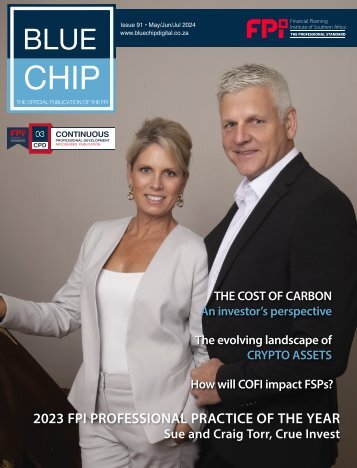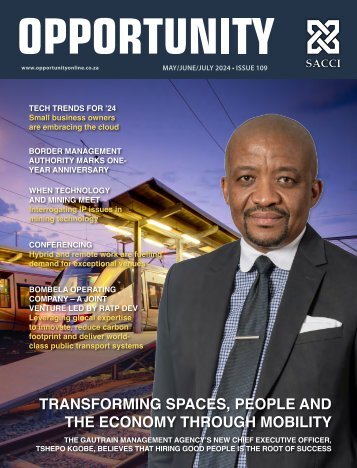South African Business 2016 edition
- Text
- Investment
- Government
- Business
- Development
- Network
- Sectors
- Investing
- Business
- Africa
- African
- Economic
- Manufacturing
- Mining
- Opportunities
- Economy
- Overview
OVERVIEW Regional
OVERVIEW Regional overview: Western Cape One of the world’s premier tourism meccas, and a province renowned for its exquisite natural splendours, the Western Cape is home to a booming tourism market, diverse manufacturing, world-class infrastructure and Africa’s largest wine exporter. Positive future When assessing what the Western Cape has achieved over the past years, Wesgro CEO Tim Harris is positive about its future. The province, for starters, has performed well on the Foreign Direct Investment (FDI) front, he says. “When it comes to FDI, we are doing quite well. Since 2010, the Western Cape brought in R7 billion, of which the bulk has gone to the services, technology, and communications industries,” Harris explains. “Apart from contributing to the provincial economy, these FDI projects have created 4 000 permanent jobs for instance in the manufacturing sector, as well as countless indirect jobs.” Wesgro figures show that the United Kingdom and the United States were responsible for the bulk of the FDI inflows into the Western Cape, with shares of respectively 26% and 23%. Other major investors were The Netherlands (8%), Germany (7%) and France (5%). A country that is gaining momentum in the Western Cape on the FDI front is China, with Hisense being one of the most important investors. This Chinese manufacturer of consumer electronics and household appliances opened a 25 200m 2 factory in Atlantis – an impoverished area some 40km outside of Cape Town, on the West Coast. This town used to be a thriving manufacturing hub until the sector started to crumble. leading to high levels of unemployment. Resurrecting Atlantis Harris adds that the future for Atlantis is set to change, and that Hisense is just the beginning, as Atlantis is in the process of being established as a Special Economic Zone (SEZ) with a specific focus on manufacturing and renewable energy. Another important SOUTH AFRICAN BUSINESS 2016 188
GENERAL GOVERNMENT SERVICES 10.8% PERSONAL SERVICES 6% FINANCE, REAL ESTATE & BUSINESS SERVICES 31% TRANSPORT, STORAGE & COMMUNICATION 9.1% WHOLESALE, RETAIL, MOTOR TRADE, CATERING & ACCOMMODATION 17% CONSTRUCTION 5% ELECTRICITY, GAS & WATER 2% MANUFACTURING 15% MINING & QUARRYING .1% AGRICULTURE, FORESTRY & FISHING 4% OVERVIEW Western Cape sector contribution. SOURCE: STATS SA company that has settled down in the area is Gestamp Renewable Industries (GRI), a Spanish renewable energy firm which recently opened a new wind tower factory there. “Atlantis has some real benefits. There used to be an industrial base there, which over the past 20 years eroded,” Harris says. “The infrastructure and the sites are still there, and there is transport infrastructure too which connects Atlantis to the port of Saldana and the city. The MyCiti busses go there too, making it a well-connected space that is ready to go.” South Africa’s retail hub It doesn’t stop here. Many of South Africa’s and Africa’s largest retailers have their offices in and around Cape Town, including Pick n Pay, Shoprite, Clicks, and Woolworths. The same counts for start-ups, emerging businesses, and tech companies. Harris: “Cape Town is the home of some very exciting newcomers such as Takealot and Yuppiechef, which are among some of South Africa’s most successful businesses. The question is what makes the Western Cape the favourable business that it apparently is? “Businesses like it here because of our world-class infrastructure, and the fact that Cape Town, the central region in particular, simply works,” Harris says. “Secondly, the companies we have dealt with, have told us that it is easier to do business in the Western Cape and Cape Town than, for instance, in Johannesburg. This is an important consideration for any business owner who wants to settle down in South Africa.” Going green The province prides itself on ‘green living’. The provincial government marked the one-year anniversary of the ‘110% Green’ initiative in June 2013. Premier Helen Zille described the campaign as making a paradigm shift to connect environmental preservation and economic growth. Projects include installing solar-panel heating systems, recycling and promoting carbonneutral manufacturing. Companies that are on board with this initiative include Eskom, Juwi, Nedbank Group, Vineyard Hotel and Woolworths. A 90MW wind farm near Wolseley was recently given the goahead. This joins a demonstrative wind farm in Darling (5MW) and the Sere Wind Farm still under construction, which will produce a proposed 100MW, both in the Western Cape. WESTERN CAPE www.westerncape.gov.za Capital Population Area Premier Cape Town 6 200 100 (2015) 129 462km 2 Helen Zille (DA) Languages Afrikaans, isiXhosa, English 189 SOUTH AFRICAN BUSINESS 2016
- Page 1:
SOUTH AFRICAN BUSINESS 2016 EDITION
- Page 6:
CONTENTS Introduction CONTENTS Sout
- Page 10 and 11:
CREDITS Publisher Chris Whales Publ
- Page 12 and 13:
SPECIAL FEATURE South Africa A peri
- Page 14 and 15:
SPECIAL FEATURE In a year that saw
- Page 16 and 17:
SPECIAL FEATURE owes its existence
- Page 18 and 19:
SPECIAL FEATURE against water losse
- Page 20 and 21:
SPECIAL FEATURE Operation Phakisa h
- Page 22 and 23:
SPECIAL FEATURE late in 2014. The h
- Page 24 and 25:
SPECIAL FEATURE Understanding Afric
- Page 26 and 27:
INTERVIEW Job creation on track Ala
- Page 28 and 29:
SPECIAL FEATURE Business funding Th
- Page 30 and 31:
SPECIAL FEATURE in turn makes it ve
- Page 32 and 33:
SPECIAL FEATURE Contact: 012 394 18
- Page 34 and 35:
SPECIAL FEATURE Black Business Supp
- Page 36 and 37:
SPECIAL FEATURE The evolution of sk
- Page 38:
SPECIAL FEATURE providing TVET lear
- Page 42:
PROFILE FP&M Seta Facilitating and
- Page 45 and 46:
• The development of a national s
- Page 48 and 49:
FOCUS Champions of change Five dyna
- Page 50 and 51:
SPECIAL FEATURE The top law firms S
- Page 52 and 53:
SPECIAL FEATURE Keeping the BRICS t
- Page 54 and 55:
SPECIAL FEATURE Keeping BEPS in che
- Page 56 and 57:
SPECIAL FEATURE IPAP in action In 2
- Page 58 and 59:
FOCUS THERE’S NO END TO THE BENEF
- Page 60 and 61:
INTERVIEW The riches of Africa awai
- Page 62 and 63:
INTERVIEW and it could actually be
- Page 64 and 65:
PROFILE ECIC exco profiles Profiles
- Page 66 and 67:
INTERVIEW The hub of Africa Tim Har
- Page 69 and 70:
Key sectors Overview of the main ec
- Page 71 and 72:
OVERVIEW from the subsistence farme
- Page 73 and 74:
OVERVIEW South Africa produces abou
- Page 75 and 76:
South Africa’s looming energy gap
- Page 77 and 78:
How will these resources be develop
- Page 79 and 80:
Vall exclusive economic zone limits
- Page 82 and 83:
OVERVIEW NEED PIC Mining The South
- Page 84 and 85:
OVERVIEW Mineral beneficiation The
- Page 86 and 87:
PROFILE The Council for Geoscience
- Page 88 and 89:
OVERVIEW Energy The South African e
- Page 90 and 91:
INTERVIEW Cummins South Africa Cumm
- Page 92 and 93:
OVERVIEW Manufacturing Increasing m
- Page 94 and 95:
OVERVIEW Automotive International i
- Page 96 and 97:
OVERVIEW Automotive components Incu
- Page 98 and 99:
OVERVIEW Chemicals and pharmaceutic
- Page 100 and 101:
OVERVIEW Healthcare South Africa’
- Page 102 and 103:
OVERVIEW Water Severe water restric
- Page 104:
OVERVIEW Improving quality The intr
- Page 107 and 108:
Our Vision is is “Quality water f
- Page 109 and 110:
OVERVIEW 107 SOUTH AFRICAN BUSINESS
- Page 111 and 112:
OVERVIEW airports in India and Braz
- Page 113 and 114:
affords, while maintaining its envi
- Page 115 and 116:
kets, except Australia. In Africa,
- Page 117 and 118:
Rosebank, Johannesburg, renamed ‘
- Page 119 and 120:
Trade with Africa Improved infrastr
- Page 121 and 122:
FOCUS MTN plugs R1.2-billion into K
- Page 123 and 124:
MTN rolls out fibre infrastructure
- Page 125 and 126:
OVERVIEW community engagement. The
- Page 127 and 128:
PROFILE For BEE Verification and is
- Page 129 and 130:
OVERVIEW attracting and retaining c
- Page 131 and 132:
OVERVIEW Small business is taken ve
- Page 133 and 134:
Franchise Fund—an innovative plat
- Page 135 and 136:
educating young people in fields th
- Page 137 and 138:
OVERVIEW Management Plan has divert
- Page 139 and 140: hazardous waste is also not being c
- Page 141 and 142: INTERVIEW yourself up as a Tier 1 o
- Page 144 and 145: OVERVIEW Renewable energy South Afr
- Page 146 and 147: INTERVIEW Plenty of scope for solar
- Page 148 and 149: LISTINGS South African business org
- Page 150 and 151: LISTINGS South African National Gov
- Page 152 and 153: LISTINGS Department of Communicatio
- Page 154 and 155: LISTINGS Department of Human Settle
- Page 156 and 157: LISTINGS Department of Science and
- Page 158 and 159: OVERVIEW Regional overview: Eastern
- Page 162 and 163: INTERVIEW Buffalo City on the rise
- Page 164 and 165: OVERVIEW Regional overview: Free St
- Page 166 and 167: OVERVIEW Regional overview: Gauteng
- Page 168 and 169: FOCUS A Catalyst for Economic Devel
- Page 170 and 171: FOCUS business people and tourists
- Page 172 and 173: OVERVIEW Regional overview: KwaZulu
- Page 174 and 175: OVERVIEW Regional overview: Limpopo
- Page 176 and 177: OVERVIEW Regional overview: Mpumala
- Page 178 and 179: The powerhouse of Africa Mpumalanga
- Page 180 and 181: Mpumalanga: Key Sectors Mpumalanga
- Page 182 and 183: Nkomazi Special Economic Zone The N
- Page 184 and 185: INVEST IN THE PROVINCE OF THE RISIN
- Page 186 and 187: OVERVIEW Regional overview: Norther
- Page 188 and 189: OVERVIEW Regional overview: North W
- Page 192 and 193: FOCUS Khayelitsha - the power of to
- Page 194 and 195: INDEX INDEX Abeco Tanks ...........
- Page 196: ENSafrica.com ENSafrica | Africa’
Inappropriate
Loading...
Mail this publication
Loading...
Embed
Loading...























































































































































